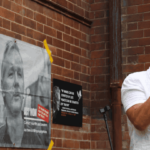Two Lawyers knew Convicted Murderer was Innocent: Why didn’t they Speak Out?

Imagine this: the fate of an innocent person is in your hands – but your professional obligations prevent you from speaking out.
One survey of Australian criminal lawyers found that 75% have regularly lain awake worrying about ethical issues connected with their work.
However, most dilemmas would not come close to the scenario faced by two US lawyers, whose client confessed to them that he had committed a murder – while they watched another man being prosecuted and convicted.
Due to professional obligations, the lawyers could not speak out – even though this would mean that Alton Logan would spend 26 years in prison for a crime he never committed.
Dale Coventry and Jamie Kunz were the lawyers for Andrew Wilson – who confessed to them that he was the one who had killed a security guard at McDonalds.
Wilson was facing unrelated charges of killing two policemen at the time.
Strangely, when the lawyers confronted Wilson and asked him if he had killed the security guard, he admitted it with a smile and gleeful look on his face.
He seemed pleased that he had got away with it, and that someone else was charged and convicted, the lawyers stated in a 60 minutes interview in 2008.
Coventry and Kunz went to the courthouse and watched Logan prosecuted, convicted and face the possibility of the death penalty.
The jury narrowly decided to spare Logan’s life, instead imposing a sentence of life imprisonment.
Throughout the whole ordeal, Wilson’s lawyers kept their silence – and did so for the next 26 years, letting an innocent man languish in prison.
So why did they keep their client’s secret?
Their decision may seem incomprehensible, unless you are familiar with the strict rules of client confidentiality and privilege.
And Logan cannot believe that for 26 years, two lawyers sat on the information that stood between him and his freedom.
Both lawyers knew that to reveal their client’s confession would be a breach of the Ethics Code.
They claim to have tried to think of a way around it, but came to the conclusion that there was nothing they could do or say without putting their own client in jeopardy.
Unless their client gave them authority to admit the truth, the men were bound to keep his secret.
And even if they had said something, it may not have led to Logan’s freedom. This is because such information would have been a violation of client-attorney privilege and may not have been admissible in court.
Instead, the men spent agonising days, watching and waiting to see what would happen in Logan’s court case.
When he was convicted, the two discussed what they would do if he was given the death penalty.
Ironically, if Logan was sentenced to death, the two lawyers would have been able to break their silence.
Odd as it may sound, the pair stated that their ethical obligations would allow them to speak out to save a life, but not in the case of life imprisonment.
Yet the lawyers did take one step to help Logan – one that would lie dormant until their client Wilson died.
The two men made an affidavit that they got information from privileged sources that Logan was not the man.
They sealed it in an envelope and kept it safe in a locked box under one of their beds.
Wilson died in 2007, allowing his lawyers to reveal the secret that finally set Logan free.
The lawyers revealed that they thought about Logan hundreds of times each year, but this is a small consolation to a man who spent over two and a half decades in prison for a crime he never committed.
Both Coventry and Kunz said their case is not unique. They believe many other lawyers are sitting on secrets that they cannot reveal.
Which raises the question, if client legal privilege can lead to such injustice, should the rules be changed in certain situations?
Client legal privilege and confidentiality in Australia
Client legal privilege is a crucial part of the lawyer-client relationship.
It means that clients are encouraged to be frank and honest with their lawyers, and therefore allows lawyers to provide them with accurate advice and high quality representation.
Without client legal privilege, the administration of justice would be hindered – as many clients would be reluctant to reveal information to their lawyers.
Of course, as pointed out by the Australian Law Reform Commission, this does have the disadvantage of meaning that courts may not always get the full story.
In Australia, a criminal defence lawyer can still defend a client who has confessed their guilt – although it is highly unadvisable for any lawyer to do so.
This is because the lawyer can only represent them in limited ways: they cannot offer a defence that is inconsistent with their confession, for example, suggesting that another person committed the crime.
Equally, they cannot tell the court of their client’s confession, unless their client authorises them to do so.
So in practice, a lawyer should always withdraw from a case if their client confesses guilt but still wants the lawyer to represent them on a ‘not guilty’ plea.
Can client legal privilege ever be broken?
According to the NSW Solicitors Rules, there are six situations where a lawyer may break confidentiality:
- The client authorises the disclosure
- The solicitor is permitted or compelled by law to do so
- The solicitor does so solely in order to obtain advice in connection with their legal or ethical obligations
- They do so with the sole purpose of preventing the probably commission of a serious criminal offence
- To prevent imminent, serious physical harm to the client or anyone else
- The information is disclosed to an insurer of the solicitor, law practice or other associated entity
What happens if a lawyer breaches client legal privilege?
Breaching the Solicitors Rules is not a criminal offence, but could still have serious consequences for lawyers.
Any breach would likely constitute unsatisfactory professional conduct or professional misconduct, and result in disciplinary action which could lead to the suspension or cancellation of a lawyer’s practising certificate.
Given the serious consequences of breaking client confidentiality, and the fact that disclosure would probably not have led to an acquittal anyway, one can understand why the American lawyers remained silent for so many years.






